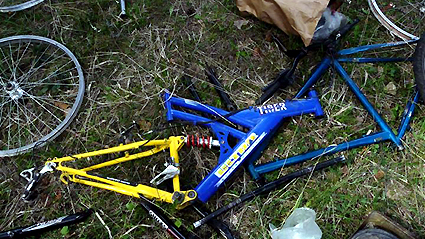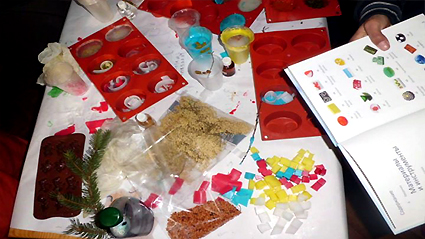 There are close to 4,000 children and youngsters in Bulgaria who live in institutions. The word means they are deprived of a home and parental care. One of the most serious problems young people leaving the institutions face is social integration. To help them find a place in life as independent people – that is the aim the people from Re-Act association have set themselves. The association was founded at the beginning of 2010 by a group of young friends – Maya, Lyuben, Bobby, Bogdan, Petar and Mitko, most of whom have graduated universities in Western Europe and have returned to Bulgaria wanting to contribute their varied skills in an attempt to alter the social environment and way of thinking. What brought these young people together was the idea that helping counts when you give your help at the right moment. They try to extend a helping hand to the young people at one of the most difficult times in their lives – when they come of age and have to leave the institution. A time when they come face to face with a number of serious problems – of finding a home, a job and planning their future.
There are close to 4,000 children and youngsters in Bulgaria who live in institutions. The word means they are deprived of a home and parental care. One of the most serious problems young people leaving the institutions face is social integration. To help them find a place in life as independent people – that is the aim the people from Re-Act association have set themselves. The association was founded at the beginning of 2010 by a group of young friends – Maya, Lyuben, Bobby, Bogdan, Petar and Mitko, most of whom have graduated universities in Western Europe and have returned to Bulgaria wanting to contribute their varied skills in an attempt to alter the social environment and way of thinking. What brought these young people together was the idea that helping counts when you give your help at the right moment. They try to extend a helping hand to the young people at one of the most difficult times in their lives – when they come of age and have to leave the institution. A time when they come face to face with a number of serious problems – of finding a home, a job and planning their future.
 “The first problem these young people face is the fact they have no family environment and no empathy on the part of society,” Lyuben Georgiev says. “They are children born and raised in conditions far worse than children born in families and raised with love, care and affection. In their development they are stunted – the main problem they face is the fact they have no specific skills and sometimes – no motivation, no vision of their lives, of their development as human beings. And here is where Re-Act comes in. What we do is to show them how to communicate and how to start believing in themselves. That is one of our major tasks – to motivate the young people, to open up a window to the world for them and to provide them with a minimum of basic skills so that they can settle somewhere, take up a job and begin a normal life.”
“The first problem these young people face is the fact they have no family environment and no empathy on the part of society,” Lyuben Georgiev says. “They are children born and raised in conditions far worse than children born in families and raised with love, care and affection. In their development they are stunted – the main problem they face is the fact they have no specific skills and sometimes – no motivation, no vision of their lives, of their development as human beings. And here is where Re-Act comes in. What we do is to show them how to communicate and how to start believing in themselves. That is one of our major tasks – to motivate the young people, to open up a window to the world for them and to provide them with a minimum of basic skills so that they can settle somewhere, take up a job and begin a normal life.”
Re-Act’s projects are based on analyses of the now existing cares for socially disadvantaged children, for their intellectual and social needs and interests, their psychological problems and their prospects of career and personal development. On the basis of the information gathered we conduct individual and group training programmes for the young people as well as for the staff of the social homes.
 “At the moment we are working with a boy who grew up in social homes for children deprived of parental care. Over the past three months we found lodgings for him in Sofia at a family temporary accommodation centre. We found him a job so that he could adapt and start work. He will now rent rooms. The problem is that children raised in institutions have a very hazy idea of the world outside and find it difficult to adapt to their new environment, they are so used to the status quo at the social home. This transition to real life is painful for Bulgarian society as well. One of our initiatives is called “Lend a hand to a child in need”. It involves providing professional training courses for children from institutions. The programme features a cookery course, a construction and house-painting course, courses in different handicrafts. In February we shall be launching a course in journalism. We want to show the young people that the world is more diverse and multi-layered than what they have seen inside the walls of the institution, to provide them with basic skills for their professional development in life. The success of our undertakings is due to the enormous enthusiasm of each and every one of us, of our friends and partners who are involved in the projects. We don’t like sitting around and waiting and we do not subscribe to the idea that social problems in Bulgaria will solve themselves and a civic society and humanity will grow out of nothing.”
“At the moment we are working with a boy who grew up in social homes for children deprived of parental care. Over the past three months we found lodgings for him in Sofia at a family temporary accommodation centre. We found him a job so that he could adapt and start work. He will now rent rooms. The problem is that children raised in institutions have a very hazy idea of the world outside and find it difficult to adapt to their new environment, they are so used to the status quo at the social home. This transition to real life is painful for Bulgarian society as well. One of our initiatives is called “Lend a hand to a child in need”. It involves providing professional training courses for children from institutions. The programme features a cookery course, a construction and house-painting course, courses in different handicrafts. In February we shall be launching a course in journalism. We want to show the young people that the world is more diverse and multi-layered than what they have seen inside the walls of the institution, to provide them with basic skills for their professional development in life. The success of our undertakings is due to the enormous enthusiasm of each and every one of us, of our friends and partners who are involved in the projects. We don’t like sitting around and waiting and we do not subscribe to the idea that social problems in Bulgaria will solve themselves and a civic society and humanity will grow out of nothing.”
English version: Milena Daynova
On 25 January 1935, Tsar Boris III signed the decree establishing the Bulgarian National Radio. The document, which officially marked the beginning of "Radio Sofia", as the Bulgarian National Radio (BNR) was then called, made radio broadcasting in Bulgaria..
The Federation of European Carnival Cities has declared Pernik a global center of masquerade traditions. 16 years ago, Prenik was named the European Capital of Sourvakar and Mummer Traditions, and nearly 10 years ago, the Surva festival was..
Bulgaria ranks last among EU Member States in terms of life satisfaction. This is according to Eurostat data for 2023 published today . With an average level of the Community indicator of 7.3 points out of 10, Bulgaria scores 5.9. Finland tops the..
The Federation of European Carnival Cities has declared Pernik a global center of masquerade traditions. 16 years ago, Prenik was named the European..

+359 2 9336 661
